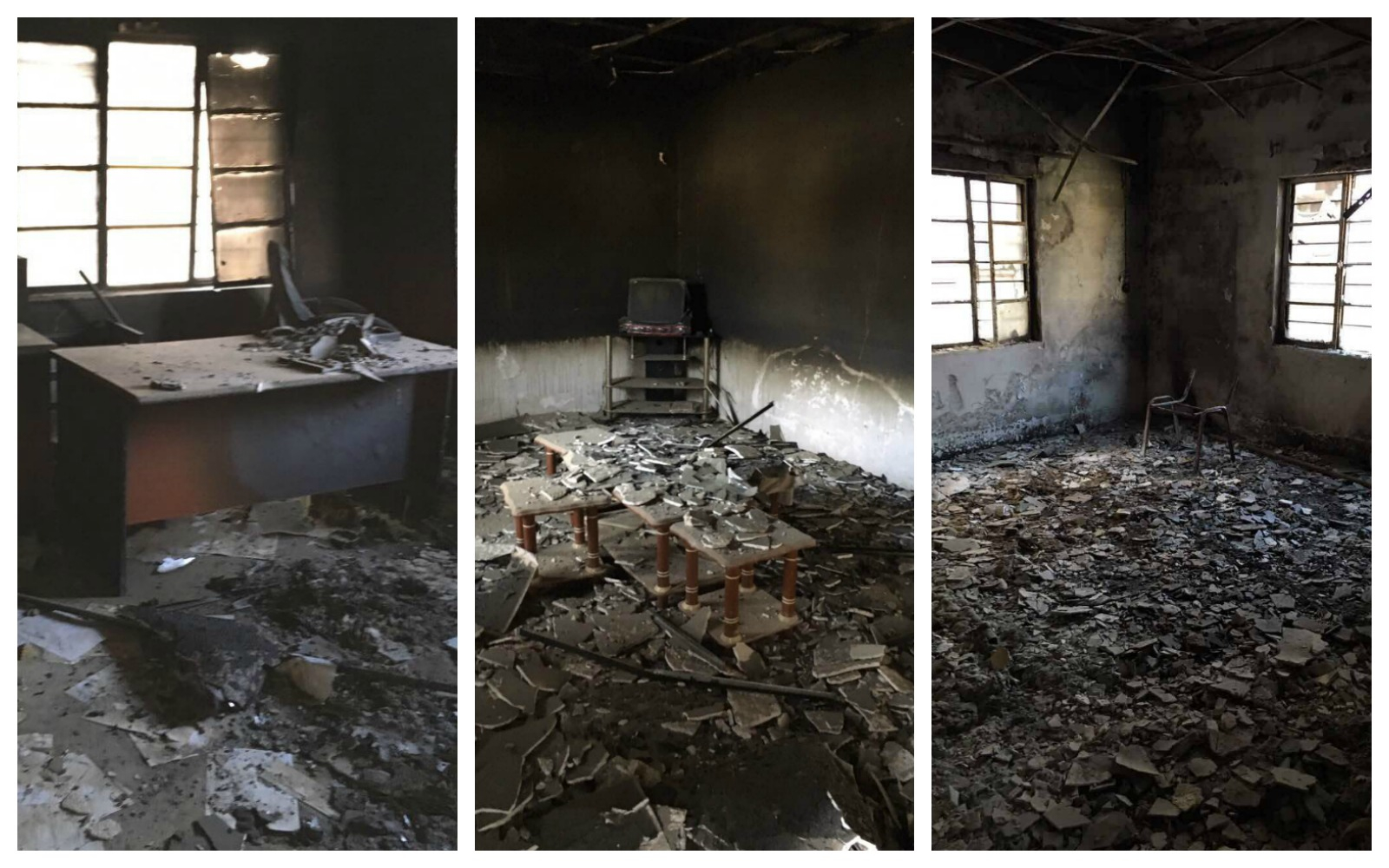
MP Youkhana and COA Habib's constituency office after ISIS burned it down. مكتب الدائرة الانتخابية للنائب يوخنا و مساعدة حبيب بعد ان احرقه داعش
SHARE
One year since the operation to liberate Mosul started, locals have begun to return home in search of whatever semblance of their previous lives might still remain. They have discovered, however, that liberation has come at a high cost, as 80 percent of the city now lies in ruin.
Nearly three million Iraqis were displaced since 2014 when the self-proclaimed Islamic State of Iraq and Syria (ISIS) took hold of Ninewa Province, including over 930,000 people who fled Mosul, the provincial capital, during the months-long battle for liberation led by Iraqi Security Forces. According to UNICEF, over 224,000 displaced residents have returned to Mosul since the end of the offensive, where they are now left to confront shortages of water, electricity and employment opportunities, on top of landmines and booby traps left behind by ISIS.
MP Youkhana and COA Habib’s temporary office on the outskirts of Qaraqosh

The daunting task of rebuilding what was once Iraq’s second largest and most diverse city now lies ahead. While citizens are grateful for liberation, they feel increasingly frustrated with the central government as the majority of cleanup and reconstruction efforts have been left to local and international non-governmental and civil society organizations, as well as the average citizen. Families, friends and neighbors are cleaning the streets, repairing buildings and removing debris from neighborhoods. Yet, alongside them are once previously displaced Members of Parliament (MP) and their Constituency Outreach Assistants (COA) who have made themselves readily available to citizens.
“As soon as our constituents started to return home, we knew it was imperative for us to be seen working in the community with and for them,” said Jovian Habib, assistant to MP Imad Youkhana from Qaraqosh, once Iraq's largest Christian city located in Ninewa Plains. To support this effort, MP Youkhana and his assistant opened a temporary constituency outreach office in October 2017 on the outskirts of the city. ISIS looted and burned down their original constituency office, which NDI had helped open in 2011. Outreach assistants receive regular coaching from NDI, overseeing the operations of the office – including the collection of citizen casework, meeting with local authorities and managing the MPs public schedule – while at the same time acting as the ‘face’ of MP relations in the community helping coordinate communication between citizens and the MP.
Citizens are in dire need of support and they see MP Youkhana and COA Habib as some of the most effective actors in the province when it comes to addressing citizens’ immediate needs: from cleaning up rubble in the streets to helping young men find employment. According to COA Habib, “If the office were not there, citizens would have nowhere and no one to turn to for direct support.” Constituency outreach and finding innovative ways to address citizens concerns have been a primary focus of MP Youkhana, both before and after liberation. During the height of the crisis, MP Youkhana met with citizens in camps for internally displaced persons (IDP) to reassure them that someone was working on their behalf and to find ways to mitigate their suffering. Now, back in Qaraqosh, the MP has been working with key government officials, state institutions and international organizations to elevate the immediate needs of his constituents.
As soon as our constituents started to return home, we knew it was imperative for us to be seen working in the community with and for them.
Jovian Habib, assistant to MP Imad Youkhana from Qaraqosh
People from Ninewa, particularly religious and ethnic minority populations, will face unique post-conflict challenges, such as housing and land reclamation, security and political representation. To effectively respond to these pressing needs, the MP and his assistant continue to seek NDI’s guidance. According to COA Habib, NDI is a trusted partner that works to instill “tolerance, awareness and to promote democratic principles all over Iraq.”
“Iraq is at a critical moment and the response to citizens’ calls for assistance will be vital in rebuilding the broken state-society relationship,” said NDI’s Iraq country director, Ancuta Hansen. “The barrage of requests from citizens to COA Habib demonstrates the necessity and importance of constituency outreach assistants and the vital role they will play in reconnecting and rebuilding citizens’ confidence in the system.”
As Iraqi Security Forces continue to drive out ISIS from its last remaining strongholds in the west, NDI will continue to support 20 MPs and their assistants, including five from newly liberated provinces, as they navigate post-conflict dynamics and address citizens’ most pressing needs, particularly those from underrepresented communities. In minority communities like the one represented by MP Youkhana, having a mechanism like a constituency office to channel citizens’ priorities and concerns directly to national-level decision-makers will contribute to filling the trust gap between citizens and government. Through these offices, and with training from NDI, MPs and their assistants will also be better positioned and prepared to devise strategies and policies that work to overcome new governance related challenges, such as the timely and equitable provision of services and resources, security, and reconstruction.
NDI’s constituency outreach program supports MPs and their assistants to operate offices throughout the country, providing an opportunity for elected representatives and hundreds of citizens to interact on a daily basis. This program is implemented with funding from the U.S. Department of State’s Bureau of Democracy, Human Rights, and Labor.


